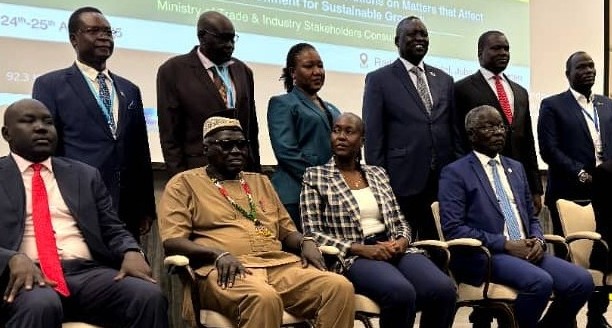
South Sudan’s economic growth remains crippled by persistent conflict, climate-related shocks, and disruptions in oil production, according to the National Minister of Trade and Industry, Atong Kuol Manyang.
Speaking during the launch of the First National Trade Forum held Thursday at the Radisson Blu Hotel in Juba, Kuol expressed concern over the country’s fragile economic state, attributing it to a combination of internal and external shocks.
“South Sudan has endured years of conflict, devastation, flooding, and rapid climate change, all of which have caused mass displacement of communities both within the country and in neighboring nations,” Kuol said.
“These factors have severely limited agricultural activities and damaged infrastructure, creating deep economic uncertainty and stalling development,” she added.
Despite being rich in oil, South Sudan faces daunting economic challenges. The country relies on oil for approximately 98% of government revenue and 80% of its GDP. However, ongoing conflict, poor governance, and corruption have undermined economic progress.
Kuol noted that the country’s dependency on crude oil exports – already weakened by the 2013 conflict and the ongoing war in Sudan – has exacerbated the situation.
“This overreliance has created a major trade imbalance. We import almost everything, which has led to the devaluation of the South Sudanese Pound, fluctuating market prices, disrupted supply chains, and business closures,” she explained.
She stressed the need to sustain peace and diversify the economy through investment in agriculture, mining, and manufacturing.
“I believe that within our challenges lie opportunities for strategic solutions to drive our economy forward. No one will come to fix it for us. The private sector cannot do it alone,” Kuol said, calling for stronger engagement with regional economic blocs and the World Trade Organization to dismantle non-tariff trade barriers.
“To move forward, we must eliminate non-tariff trade barriers such as quotas, tariffs, and other restrictions,” she emphasized.
Also speaking at the event, Gideon Beny Mabor, Undersecretary in the Ministry of East African Affairs, pledged government support in fostering investor partnerships to spur growth.
“We will work together to close the gap between the private sector and the government. In the end, we are all consumers,” Mabor stated.
Echoing similar sentiments, Onyito Adigo, Minister of Livestock and Fisheries, highlighted the critical role of public-private collaboration in national development.
“In this forum, the public and private sectors must join hands for the welfare of the people of South Sudan,” Adigo concluded.

